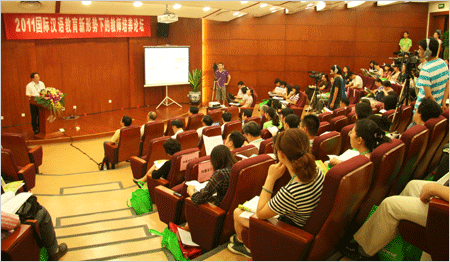
The "2011 International Forum on Chinese Teacher Training" co-sponsored by the Open University of China (OUC) and China Education Television and organized by the OUC Chinese Language Center was held at the China Hall of Science and Technology Hotel on the afternoon of August 12, 2011. The Forum's purpose was to give impetus to the building of an international team of Chinese language teachers, to address the emerging global demand for Chinese language education, and to better solve the problem of "teachers" among the three key elements of "teachers, teaching materials and teaching methods" that limit the development of international Chinese education.

President Yang Zhijian of the OUC and assistant chief of China Education Television Chen Li attended and addressed the opening ceremony. Cui Xiliang, President of Beijing Language and Culture University, and Joel Bellassen, Inspector of Chinese Language Teaching with the Ministry of Education in France, delivered speeches by way of video as well.
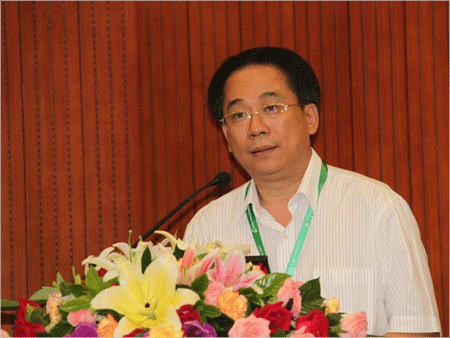
President Yang introduced the education philosophy and core values of the OUC, and pointed out that the OUC now stands at an important crossroads in its 30 years of development. He believes that within the national open university framework, international Chinese language education will soon constitute a major part of continuing degree and non-degree education as well as an important component of the OUC's internationalization strategy. He stressed that teaching Chinese as a foreign language is a means to propagate Chinese culture and "help the world understand China", and that a key mission and responsibility of the OUC is to help people better understand China's culture and values. During the past 10 years of teaching Chinese as a foreign language, the OUC has made some significant achievements thanks to the policies of the national Hanban and the development of modern information technology. To help solve a series of problems in training international Chinese teachers, the OUC has developed the "MyEChinese" platform. As a subset of the larger OUC platform, it specializes in providing a wide variety of online training for Chinese language instructors, both in China and abroad. The site not only equips those interested in international Chinese teaching with essential knowledge and skills, but also helps professional Chinese teachers or Chinese education majors further improve their professional knowledge and abilities.
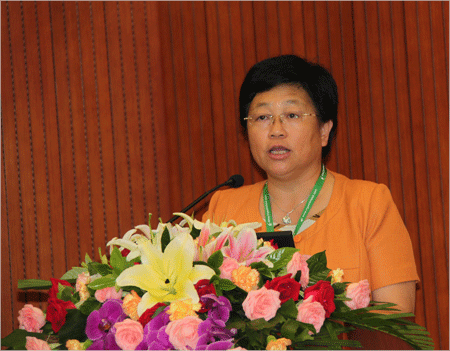
Chen Li indicated that amidst the backdrop of economic globalization and the hot demand for learning Chinese, the foundation and development of the Confucius Institutes have provided an important channel for the international promotion of Chinese language and culture, the establishment of China's international image, and the enhancement of international exchange and dialogue between China and other countries. The "International Forum on Chinese Teacher Training" by the OUC and China Education Television is not only a symbol of the collaboration of the two sponsors in the field of Chinese language promotion for many years but also a contribution to the research and discussion of the latest emerging problems regarding Chinese teachers and teaching materials. The forum also pooled the shared resources and experience of both sponsors as well as ideas by experts and scholars to address the national strategy for Chinese culture "going global" and the proposal of strengthening international educational exchanges put forward in the National Outline for Medium and Long-term Education Reform and Development.
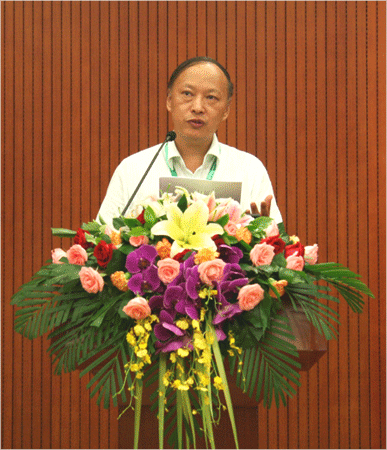
Director Liang Xiaoqing of the OUC Chinese Language Center gave a review of the history of the OUC on distance Chinese education. From the start of teaching Chinese through the U.S. SCOLA (Satellite Communication for Learning Association) in North America to the publication of a series of multi-media teaching materials such as China Panorama and Easy Chinese, from the success of the first online Confucius Institute to the development of the MyEChinese distance teaching platform, every step benefited from the implementation of the national strategy of "going global", the guidance from Hanban, OUC's philosophy and 30 years of experience in open and distance education, and the interdisciplinary team of distance Chinese language instructors. He indicated that teaching Chinese and Chinese culture to foreigners helped to construct a bridge of communication, exchange and equality between China and the rest of the world. In a short period of ten years, the OUC has adopted the mission of the nation and society as its responsibility, implementing a broad and far-reaching system of Chinese education that is bold, innovative, and continually improving. He stated his conviction that in the future, the OUC would make even greater contributions to the strategy of making China go global.

Discussions at the main forum covered issues of training methods for international Chinese teachers, training standards and the development of curriculum and teaching materials, country-specific strategies and training of local teachers, and the application of modern education technology in the training of Chinese teachers. Director Zhang Wangxi of the HSK Center in Beijing Language and Culture University, Professor Li Quan of the School of Teaching Chinese as a Foreign Language in Renmin University of China, Professor Wang Ruojiang of the School of Chinese as a Second Language in Peking University, Dean Zhou Xiaobing of the School of International Chinese Language in Sun Yat-sen University, Professor Wu Yongyi of the School of Teaching Chinese as a Foreign Language in East China Normal University, and Associate Professor Xong Yuzhen of the College of Chinese Language and Culture in Jinan University made excellent keynote speeches. They shared their latest research results and put forward their insightful thoughts and views.
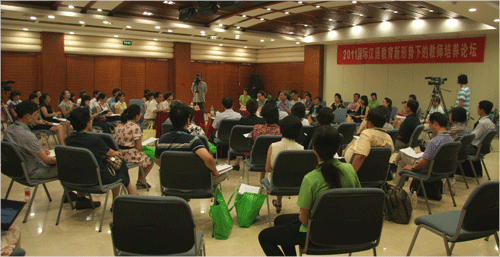
About 70 teachers and scholars from home and abroad attended the sub-forums, and discussed and exchanged ideas on their own lines of research. All participants participated enthusiastically in the final round table forum, and eagerly made speeches. OUC Vice President Zhang Shaogang, in the closing speech, recognized the fruitful results of the forum and urged the continuation of the forum in the coming year. Meanwhile, he put forward the idea of training "teachers with wisdom" in the future so as to meet the constantly changing requirements of the times.
This forum complied with the new demands of the development of international Chinese education. Specific and intensive discussions were made on teacher training and other issues challenging the development of international Chinese teaching, triggering deep thought from both academic and professional circles and accelerating further progress in the training of international Chinese teachers.